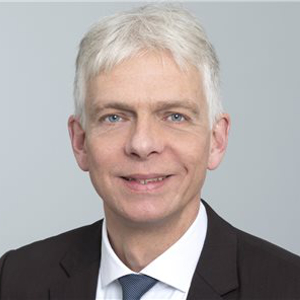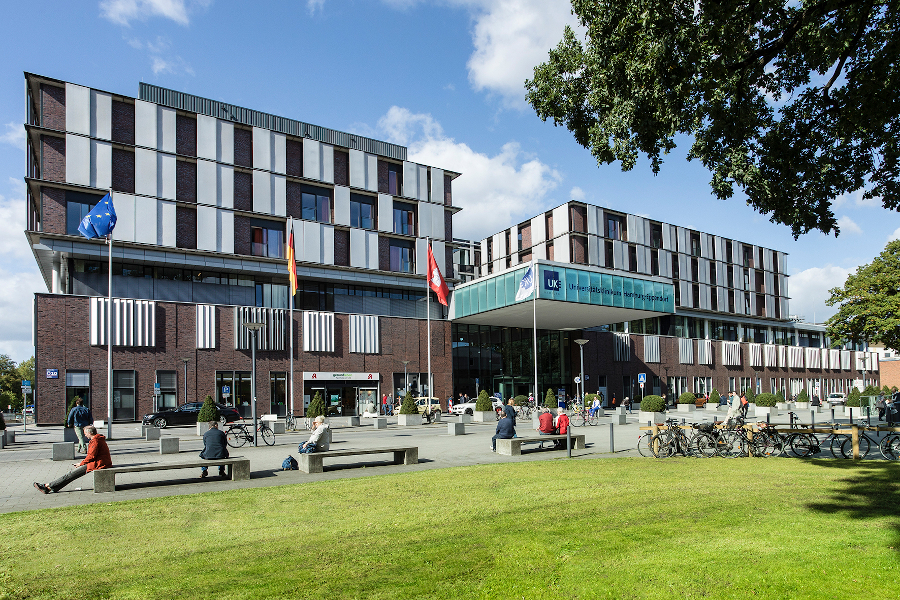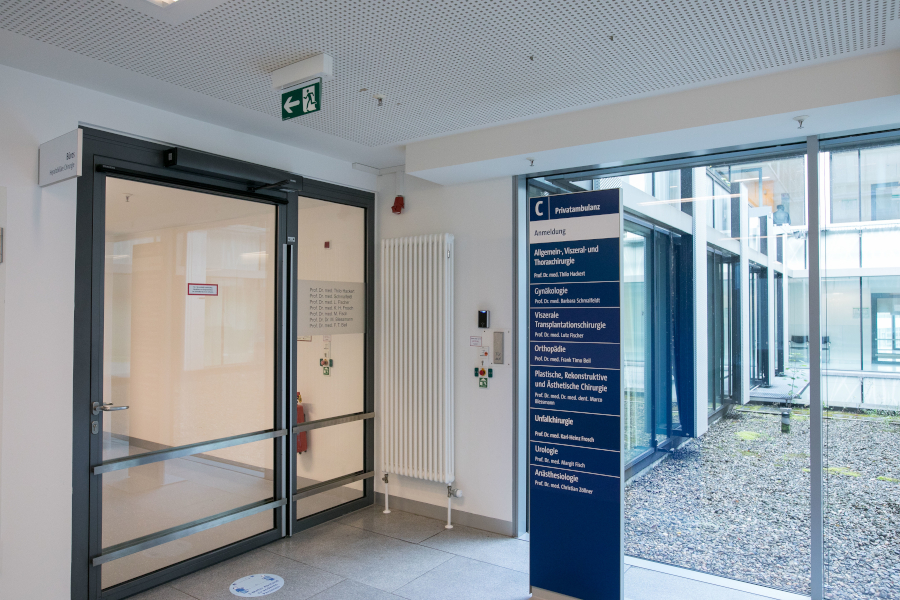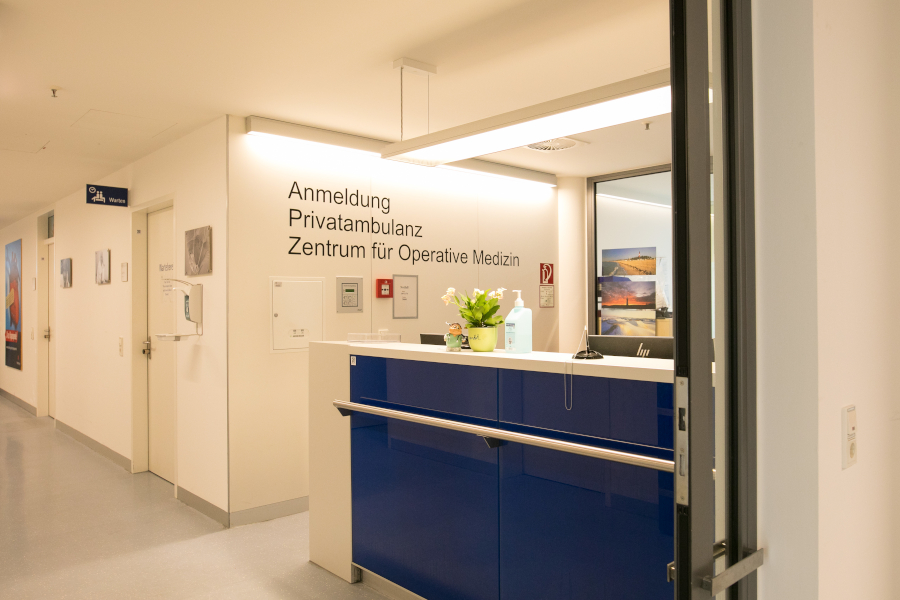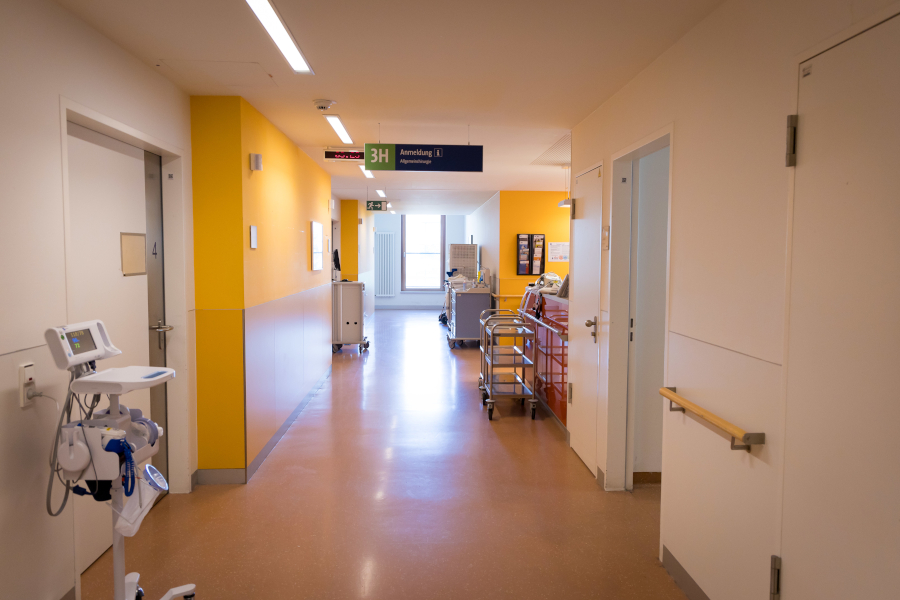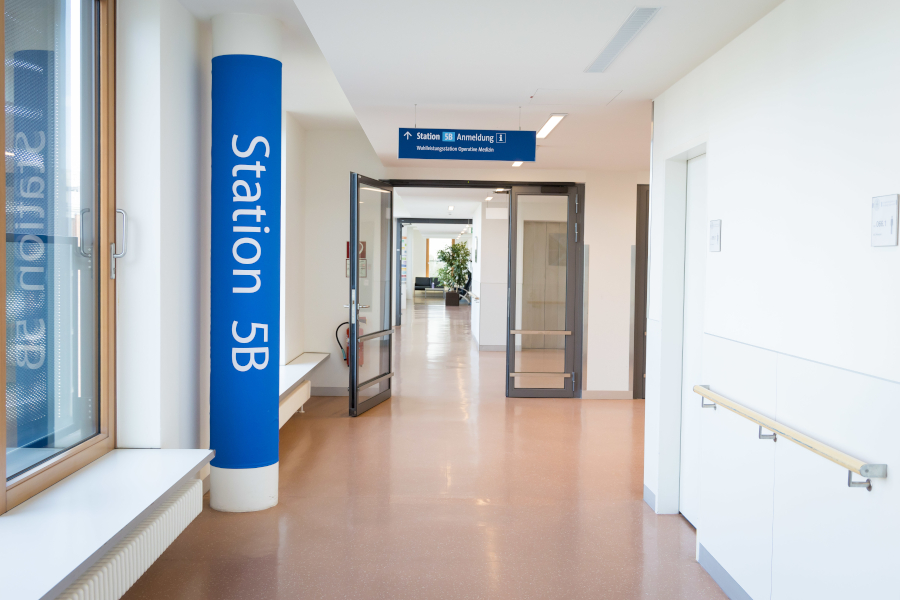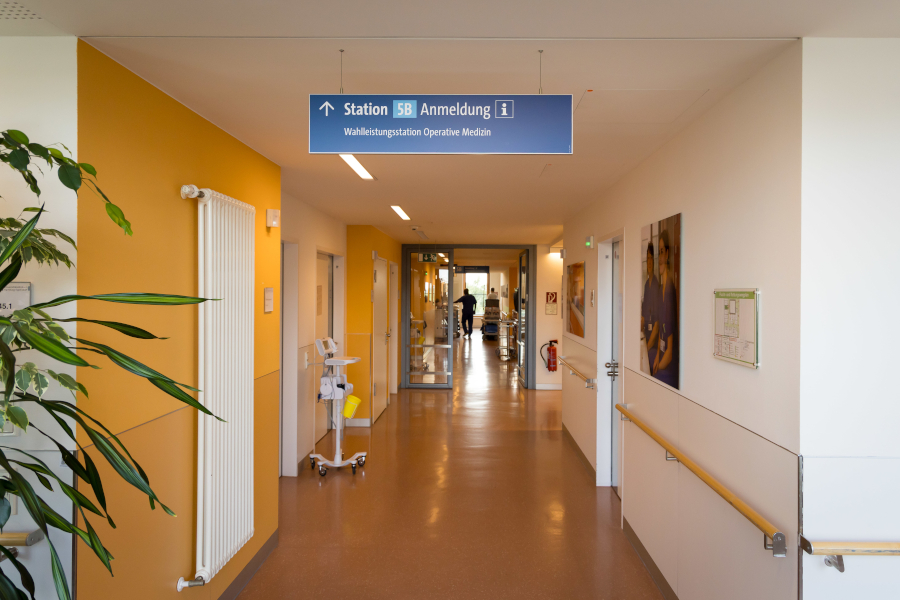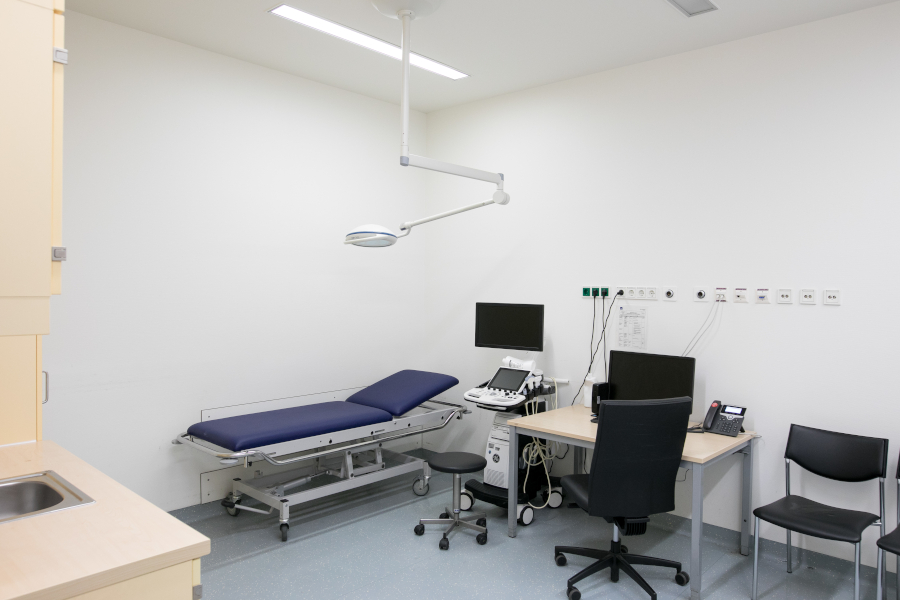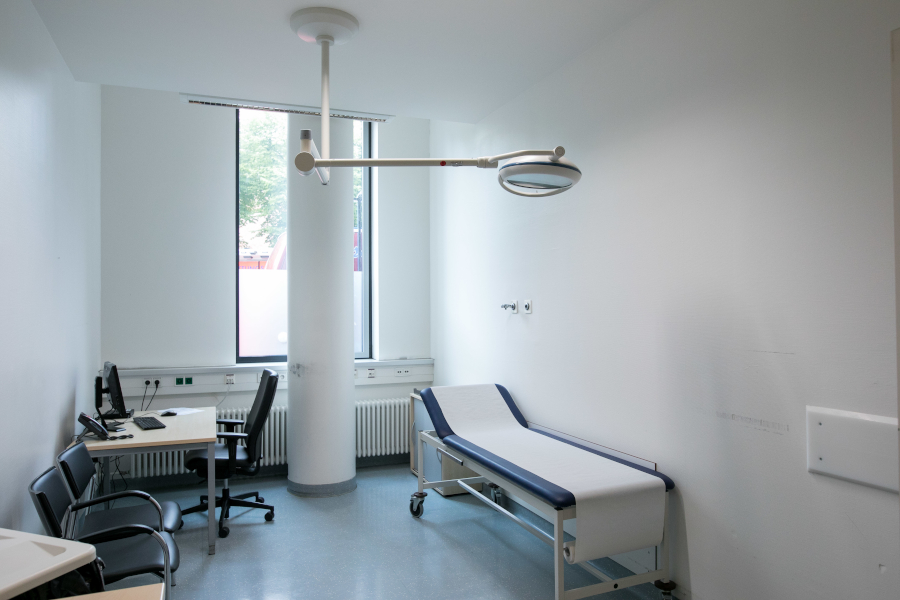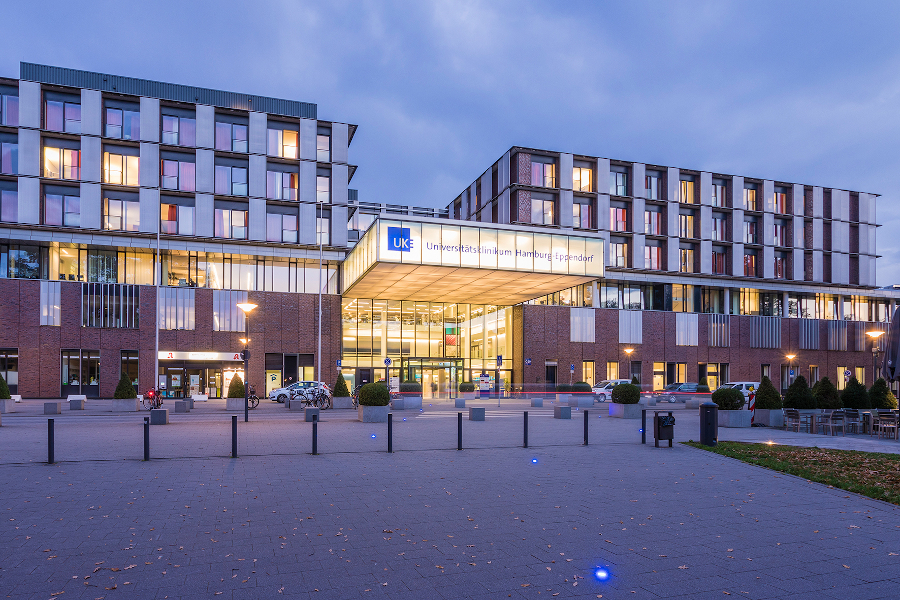Oncological Surgery Hamburg: Prof. Dr Thilo Hackert
Treatment focus
- Pancreatic tumors (carcinoma/neuroendocrine) and particular forms (cystic pancreatic tumors)
- Liver tumors, liver metastases
- Colon cancer
- Esophageal and gastric cancer
- Soft tissue tumors (sarcomas)
- Tumors of the lung and mediastinum
Contact
Hamburg-Eppendorf University Hospital
Clinic for General, Visceral, and Thoracic Surgery
Martinistraße 52, D-20246 Hamburg
P: +49 40 797 243 17 F: +49 40 7410 449 95
Consultation Hours:
Monday, Wednesday, Friday 8:00 AM - 3:00 PM
and by appointment
Medical Range
Range of Diagnostic Services
Complete diagnostics for the diseases mentioned above in cooperation with the UKE clinics:
- Radiology
- Endoscopy
- Gastroenterology
- Nuclear medicine
- Laboratory medicine
- Pathology
Range of Therapeutic Services
The entire spectrum of oncological visceral and thoracic surgery, including laparoscopic and robotic procedures for:
- Esophageal cancer
- Gastric cancer
- Liver cancer
- Pancreatic cancer
- Small Intestinal cancer
- Colorectal cancer
- Neuroendocrine tumors
- Adrenal tumors
- Sarcomas
- Peritoneal carcinomatosis
- Lung cancer
- Thymoma
- Thyroid disorders
- Bariatric surgery
More Information
Card
Prof. Dr Thilo Hackert is a specialist in oncological surgery and director of the Clinic for General, Visceral, and Thoracic Surgery at the Hamburg-Eppendorf University Hospital (UKE).
As a visceral oncology center certified by the German Cancer Society for treating liver, bowel, pancreatic, and esophageal cancer, the highly specialized team, under the direction of Prof. Hackert, develops the best possible treatment for each patient. The aim is always to preserve or restore the organ's function and reduce pain using minimally invasive procedures.
Most Extraordinary Expertise in Treating Pancreatic Cancer at the Certified Pancreas Center Hamburg
Pancreatic cancer is complex and requires a great deal of experience and routine in the correct treatment. The University Clinic for General, Thoracic, and Visceral Surgery in Hamburg-Eppendorf, under the direction of Prof. Dr Thilo Hackert, is one of the top oncology centers in Germany and, with a high number of cases and great expertise, provides excellent medical care in the field of oncology.
Pancreatic cancer is often diagnosed relatively late and consequently in advanced stages due to non-specific symptoms. Signs of a pancreatic tumor can include upper abdominal discomfort, back pain, and weight loss.
The UKE will carry out comprehensive imaging diagnostics if a malignant pancreatic tumor is suspected. In addition, tissue samples are taken in a biopsy to confirm the diagnosis.
Afterward, the search for tumor metastases begins. The Hamburg clinic ensures fast and precise diagnostics and an interdisciplinary approach. Interdisciplinary tumor conferences involving various specialties such as surgery, oncology, radiotherapy, and pathology take place regularly and in detail.
An individual treatment plan is created by the team and discussed in detail with the patient. The clinic places a high value on competent counseling at all levels. Patients can talk in detail with specialists from various fields about their cancer and discuss their questions thoroughly.
Depending on the position of the tumor, different surgical procedures are possible. The surgeons at the UKE always aim to preserve as much intestinal tissue as possible. The top oncology team, led by Prof. Dr Thilo Hackert, has the most experience in pancreatic surgery in northern Germany. In addition, the clinic offers the ERAS program to optimize recovery after surgery.
Due to the long duration of cancer treatment, the UKE ensures that patients have set contact persons and can build a solid relationship based on trust. Structured aftercare is also of great importance. A dedicated pancreatic hotline allows patients to get advice and information anytime.
Specialist in Liver Tumors and Metastases
The most common liver tumors are metastases from cancers in other organs. However, the liver cells or bile ducts themselves can also be the starting point of a malignant cancer.
Risk factors for liver cancer include nicotine and alcohol, chronic liver infections, obesity, and liver cirrhosis. Liver cancer is often diagnosed by coincidence, as the symptoms are usually unspecific. Pain and a feeling of pressure may occur, and jaundice may develop due to compression of the bile ducts.
Whenever possible, UKE surgeons aim for surgical removal of the tumor or metastases. In the process, up to two-thirds of the liver tissue can be removed since the liver has a high regenerative capacity.
Here, the ERAS program is also used postoperative to support the recovery of the affected patients. Optimized treatment processes and specially trained nursing staff serve the goal of the best possible treatment and rapid mobilization of patients.
State-of-the-Art Treatment Approaches at the Esophageal Cancer Center Hamburg
Esophageal cancer is a relatively rare disease, so treatment at an experienced center is of great importance for the treatment outcome. Risk factors for esophageal degeneration include smoking, alcohol consumption, long-term heartburn, and obesity.
Depending on the cells from which the tumor originates, there are two types of esophageal cancer. Adenocarcinoma originates from the glandular cells, whereas squamous cell carcinoma, which is more common, originates from the covering cells of the esophagus. If esophageal cancer is suspected, the physicians at the UKE carry out an endoscopy of the esophagus and stomach. If abnormal findings are detected, samples are taken and sent to the pathology department for examination.
If the findings are malignant, further imaging tests are carried out, and the patient's case is discussed with the interdisciplinary tumor board. Minimally invasive surgical options are steadily increasing. The treating physicians in Hamburg discuss in detail with the patients beforehand whether endoscopic surgery is an option. For larger and more advanced tumors, a skin incision is necessary, and in some cases, prior chemotherapy is required. Therapy planning at the Hamburg-Eppendorf University Hospital is based on the latest scientific findings.
Diagnosis and Treatment of Gastric Cancer
Feelings of fullness, loss of appetite, weight loss, and night sweats may point to gastric cancer. If cancer is suspected, a tissue sample is taken during a gastroscopy, which is followed by further imaging staging diagnostics using ultrasound and computed tomography. This makes it possible to determine how far the tumor has spread and whether metastases are already present.
Depending on the patient's age, the Hamburg specialists in oncological surgery also examine genetic components since gastric cancer can run in families. If gastric cancer is detected in its early stages, a cure can be achieved by removing the stomach. In advanced cases, chemotherapy is often necessary before surgery to reduce the size of the tumor.
Palliative chemotherapy can be used to alleviate the symptoms of end-stage tumors. Psycho-oncological and pastoral care is offered at the UKE for all types of tumors.
Fighting Colon Cancer: Advanced Therapies and Comprehensive Care
Colon cancer is the second most common form of cancer in Germany and has a relatively good chance of recovery with early diagnosis. For early recognition, a stool examination is carried out as part of the general practitioner's preventive medical check-up, and at a certain age, a regular colonoscopy is carried out.
After the diagnosis has been confirmed, the specialists from the various departments of the UKE work together to create an individual and structured treatment plan. The therapy is then carried out in close cooperation with all the departments involved.
A state-of-the-art surgical robot is used at the UKE Hamburg-Eppendorf. The robot-assisted DaVinci procedure enables a sensitive and nerve-sparing approach. If possible, experienced surgeons place great importance on preserving the sphincter muscle to ensure continence.
Small scars ensure a faster recovery, and the most modern equipment for stopping blood loss at the Hamburg clinic ensures that blood loss during surgery is kept to a minimum. By using intraoperative ultrasound, cancer metastases, for example, in the liver, can be diagnosed so that the metastases can be removed directly in the same procedure.
The anesthesia team has extensive experience in administering anesthesia to high-risk patients. The highly specialized physicians at the Hamburg-Eppendorf University Hospital are constantly expanding their knowledge, and their treatment follows national and international guidelines.
After surgery, patients receive comprehensive follow-up care, and nutrition therapists and, if necessary, stromal specialists take care of the patients. The UKE team also organizes contact with self-help groups.
Curriculum Vitae
Professional Career
| Since February 2023 | Director of the Clinic for General, Visceral and Thoracic Surgery, Hamburg-Eppendorf University Hospital |
| May 2018 | Senior Consultant and Representative Medical Director |
| January 2014 | Head of the Pancreatic Surgery Section, Heidelberg University Hospital |
| 2010 | Specialist Certification in Visceral Surgery |
| June 2007 | Representative Head of the European Pancreas Center, Surgical Clinic, University of Heidelberg |
| June 2007 | Senior Physician of the Surgical University Hospital |
| 2005 | Specialist Certification for Surgery |
| December 2000 - August 2005 | Specialist Training Surgical Clinic, University of Heidelberg |
| June 1999 - November 2000 | Physician in Internship, Surgical Clinic, University of Heidelberg |
| 1992 - 1999 | Studies in Human Medicine at the University of Heidelberg |
Academic Career
| June 2022 | Appointment to the W3 Professorship for General, Visceral and Thoracic Surgery, Hamburg-Eppendorf University Hospital |
| June 2022 | Appointment to the W2 Professorship for Pancreatic and Transplant Surgery, University of Dresden |
| February 2016 | MBA, Health Management & Controlling, Baden-Württemberg Cooperative State University |
| June 2012 | Extraordinary Professorship, Faculty of Medicine, University of Heidelberg |
| July 2008 | Habilitation, University of Heidelberg, Clinic for General, Visceral and Transplant Surgery (Prof. Dr M.W. Büchler) "Influence of Humoral and Cellular Coagulation Components on the Pathophysiology and Therapy of Acute Pancreatitis and Transplant Pancreatitis." |
| May 2000 | Doctorate, University of Heidelberg, Clinic for Cardiac Surgery (Prof. Dr S. Hagl) "Effects of an Acute Irreversible Increase in Intracranial Pressure on Contractility and Ischemia Tolerance in the Isolated Heart." |
Team
 Prof. Dr Oliver Mann, FACS
Prof. Dr Oliver Mann, FACS
Representative Director of the Clinic PD Dr Felix Nickel, MME
PD Dr Felix Nickel, MME
Senior Consultant Prof. Dr Thilo Welsch, FACS MBA
Prof. Dr Thilo Welsch, FACS MBA
Managing Senior Physicians PD Dr Asmus Heumann
PD Dr Asmus Heumann
Managing Senior Physicians Dr Rainer Grotelüschen
Dr Rainer Grotelüschen
Managing Senior Physicians Dr Philipp Busch
Dr Philipp Busch
Senior Physician PD Dr Anna Duprée
PD Dr Anna Duprée
Senior Physician PD Dr Tarik Ghadban, FEBS, MHBA, FACS
PD Dr Tarik Ghadban, FEBS, MHBA, FACS
Senior Physician PD Dr Nathaniel Melling
PD Dr Nathaniel Melling
Senior Physician Dr Anna Nießen
Dr Anna Nießen
Senior Physician PD Dr Faik G. Uzunoglu
PD Dr Faik G. Uzunoglu
Senior Physician
Extras
- Implementation of HIPEC and HITOC (intraoperative hyperthermic chemotherapy in the abdomen and chest)
- IRE (irreversible electroporation) for inoperable tumors (e.g., pancreas)
- ERAS program (Enhanced Recovery after Surgery)
Transport Connections
| Hamburg Main Station | 5.7 km |
| Hamburg Airport | 6.5 km |
Information about Hamburg
The capital of the federal state of the same name is located in the north of Germany on the three rivers Elbe, Bille and Alster. The districts in the city centre are of particular interest to tourists. Hamburg has been a Free and Hanseatic City since the Middle Ages and in this tradition, the port of Hamburg on the Elbe is both an economic centre and a tourist attraction.

